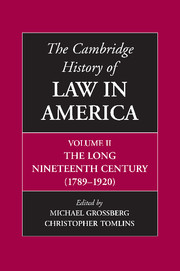Book contents
- Frontmatter
- 1 Law and the American State, from the Revolution to the Civil War: Institutional Growth and Structural Change
- 2 Legal Education and Legal Thought, 1790–1920
- 3 The Legal Profession: From the Revolution to the Civil War
- 4 The Courts, 1790–1920
- 5 Criminal Justice in the United States, 1790–1920: A Government of Laws or Men?
- 6 Citizenship And Immigration Law, 1800–1924: Resolutions Of Membership And Territory
- 7 Federal Policy, Western Movement, and Consequences for Indigenous People, 1790–1920
- 8 Marriage and Domestic Relations
- 9 Slavery, Anti-Slavery, and the Coming of the Civil War
- 10 The Civil War And Reconstruction
- 11 Law, Personhood, and Citizenship in the Long Nineteenth Century: the Borders of Belonging
- 12 Law in Popular Culture, 1790–1920: The People and the Law
- 13 Law and Religion, 1790–1920
- 14 Legal Innovation and Market Capitalism, 1790–1920
- 15 Innovations in Law and Technology, 1790–1920
- 16 The Laws of Industrial Organization, 1870–1920
- 17 The Military in American Legal History
- 18 The United States and International Affairs, 1789–1919
- 19 Politics, State-Building, and the Courts, 1870–1920
- Bibliographic Essays
- Notes on Contributors
- Index
- References
18 - The United States and International Affairs, 1789–1919
Published online by Cambridge University Press: 28 November 2008
- Frontmatter
- 1 Law and the American State, from the Revolution to the Civil War: Institutional Growth and Structural Change
- 2 Legal Education and Legal Thought, 1790–1920
- 3 The Legal Profession: From the Revolution to the Civil War
- 4 The Courts, 1790–1920
- 5 Criminal Justice in the United States, 1790–1920: A Government of Laws or Men?
- 6 Citizenship And Immigration Law, 1800–1924: Resolutions Of Membership And Territory
- 7 Federal Policy, Western Movement, and Consequences for Indigenous People, 1790–1920
- 8 Marriage and Domestic Relations
- 9 Slavery, Anti-Slavery, and the Coming of the Civil War
- 10 The Civil War And Reconstruction
- 11 Law, Personhood, and Citizenship in the Long Nineteenth Century: the Borders of Belonging
- 12 Law in Popular Culture, 1790–1920: The People and the Law
- 13 Law and Religion, 1790–1920
- 14 Legal Innovation and Market Capitalism, 1790–1920
- 15 Innovations in Law and Technology, 1790–1920
- 16 The Laws of Industrial Organization, 1870–1920
- 17 The Military in American Legal History
- 18 The United States and International Affairs, 1789–1919
- 19 Politics, State-Building, and the Courts, 1870–1920
- Bibliographic Essays
- Notes on Contributors
- Index
- References
Summary
The United States did not join the ranks of great powers until after the Spanish-American War and did not become a decisive force in global affairs until World War I. This apparent trajectory from isolated insularity to great power stature has generated the myth that until the “imperial thrust” of the late 1890s, Americans enjoyed a certain “free security,” from George Washington’s presidency to Theodore Roosevelt’s, afforded by the fortuitous combination of geography and European preoccupations. Yet, from the earliest days of the Republic, competition and consolidation among European states – projected to every part of the globe – shaped the hemispheric and international context for America’s continental expansion, economic ascent, and evolving constitutional order. In the first decades after the ratification of the Constitution, the nascent Republic pushed up against British, Spanish, French, and Native American holdings, and it truly was hostage to great power rivalries. Successive territorial acquisitions, the migration of Americans and their enterprises to all areas of the world behind the forward European advance, the end of formal European empires in the Americas, and the establishment of virtual U.S. regional hegemony in the Caribbean all unfolded in an interstate and increasingly capitalist world system. While modern state-building projects generated and naturalized the boundary between “domestic” and “foreign” affairs, expansion, transplantation, porosity, and transcendent founding principles confounded the complex construction of the “United States” as a distinct, fixed, concrete territorial nation-state.
- Type
- Chapter
- Information
- The Cambridge History of Law in America , pp. 604 - 642Publisher: Cambridge University PressPrint publication year: 2008



